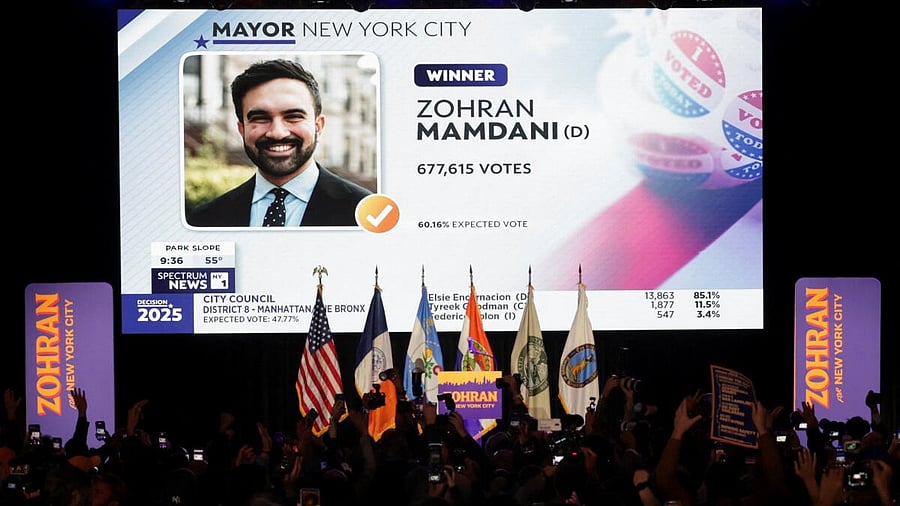
Supporters of Democratic candidate for New York City mayor Zohran Mamdani reacts to initial projections of his win during an election night rally in the Brooklyn borough of New York City, New York, U.S., November 4, 2025.
Credit: Reuters Photo
New York: Zohran Mamdani, a 34-year-old state lawmaker who transformed himself into an electrifying voice for New Yorkers disillusioned with runaway living costs and a scandal-plagued old guard, was elected the city’s 111th mayor on Tuesday.
His victory, stretching from the gentrified corridors of Brooklyn to the working-class immigrant enclaves of Queens, completed one of the most remarkable political upsets in New York history and will soon put a democratic socialist in City Hall.
Mamdani defeated former Governor Andrew Cuomo in a rematch of June’s Democratic primary, as New Yorkers soundly rejected a man who was once the state’s most powerful figure for the second time in five months. Curtis Sliwa, the Republican, was in a distant third place, and conceded earlier in the night.
Turnout surged past 2 million voters, the highest level of participation in one of the city’s municipal elections since 1969.
A state Assembly member from Queens, Mamdani had entered the contest a year ago as little more than a protest candidate with a thin résumé and virtually no citywide profile.
But his intense focus on affordability, mastery of social media and relentlessly infectious optimism about New York galvanized record turnout among young voters and immigrant groups, catapulting him past more seasoned rivals.
Now, he is poised to make history. He will be New York City’s youngest mayor since the 19th century, and its first Muslim and first South Asian mayor. Born in Uganda to parents of Indian descent, he will also be the first naturalized immigrant to serve as mayor since Abraham Beame in the 1970s.
Mamdani campaigned as an insurgent against the city’s long-running political and business establishment. He has called for raising taxes on the wealthy, making buses and child care free, a rent freeze for rent-stabilized apartments and overhauling a Police Department he has harshly criticized.
But he will face profound challenges when he takes office on Jan. 1. Gov. Kathy Hochul and Albany lawmakers hold the strings to the purse needed to fund his plans. Many Jewish New Yorkers and business leaders deeply mistrust him.
Looming over all of it was President Donald Trump, who even before Mamdani’s victory had identified “my little communist mayor” as a target of his ire. The president officially backed Cuomo on the eve of the election.
Trump has threatened to make New York the next target in his fight with American cities, potentially cutting off federal funds and deploying the National Guard, if Mamdani pursues policies he does not like.
The results put a punctuation mark on a remarkable stretch for New York City. It began last fall when Mayor Eric Adams, who in a typical year would be the favorite for reelection, was indicted on federal corruption charges.
Adams did not run in the Democratic primary, and then abandoned his third-party bid for reelection in September. His late-stage endorsement of Cuomo did not seem to significantly help the former governor.
And the closing weeks of the campaign were exceptionally bitter, shaken by accusations of antisemitism and Islamophobia.
Mamdani accused Cuomo of selling out the city, its transit system and its housing stock to big-money donors. Voters ultimately seemed unwilling to give Cuomo another chance after he was run out of the governorship amid allegations of sexual harassment.
Cuomo, in turn, tried to portray Mamdani as a far-left radical who would endanger New Yorkers’ finances and security. The tone of Cuomo and his allies became notably menacing in the race’s final weeks, as he chased conservative voters with messages that played to fear about Mamdani’s Muslim faith and foreign origin.
Voters also weighed in on a number of other contests including two citywide positions, comptroller and public advocate. In Manhattan, Alvin Bragg won reelection as the district attorney.
On the back side of the ballot, voters were asked to consider six proposals, including three on housing development in the city. Those three, which have been contentious, are intended to remove some political and bureaucratic barriers to development that would allow some projects to bypass the City Council.